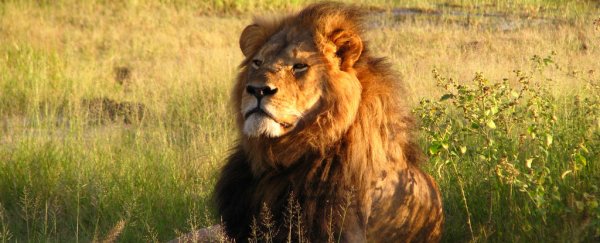The US government has sent a powerful message to lion sports hunters, announcing that it will amend its Endangered Species Act to include protections for African lions and tighten laws to restrict the importation of wildlife trophies.
The move, which the US Fish and Wildlife Service (FWS) says is in response to the dramatic decline of lion populations in the wild, comes less than six months after the furore over the killing of Cecil – a male Southwest African lion who was shot and killed in Zimbabwe by an American dentist and recreational big-game hunter.
"The lion is one of the planet's most beloved species and an irreplaceable part of our shared global heritage," said Dan Ashe, director of the FWS. "If we want to ensure that healthy lion populations continue to roam the African savannahs and forests of India, it's up to all of us – not just the people of Africa and India – to take action."
According to the FWS, lion populations have declined by 43 percent in the last 20 years, through a combination of habitat loss, loss of prey, and poaching.
Under the amendments, two lion subspecies will be protected by the Endangered Species Act. Panthera leo leo, found in India and western and central Africa, will be listed as endangered, and Panthera leo melanochaita, from eastern and southern Africa, will be listed as threatened.
Under endangered status with just 1,400 remaining, P. l. leo, commonly called the African lion, will generally be prohibited from importation into the US, unless it can be found that the import will have a benefit to the species.
P. l. melanochaita, which number between 17,000 and 19,000, is deemed as less vulnerable and currently not in danger of extinction, but will be subject to tighter regulations with regard to importation, including both live animals and trophies from sports hunting.
"Sustainable trophy hunting as part of a well-managed conservation program can and does contribute to the survival of the species in the wild, providing real incentives to oppose poaching and conserve lion populations," said Ashe. "Implementing a permit requirement will give us the authority we need to work with African countries to help them improve their lion management programs."
In addition to the new statuses, the FWS has also issued a new order to ensure that those who violate wildlife laws will lose the ability to secure future permits for wildlife-related activities.
"Importing sport-hunted trophies and other wildlife or animal parts into the United States is a privilege, not a right; a privilege that violators of wildlife laws have demonstrated they do not deserve," said Ashe. "We are going to strengthen our efforts to ensure those individuals – people who have acted illegally to deprive our children of their wildlife heritage – are not rewarded by receipt of wildlife permits in the future."
